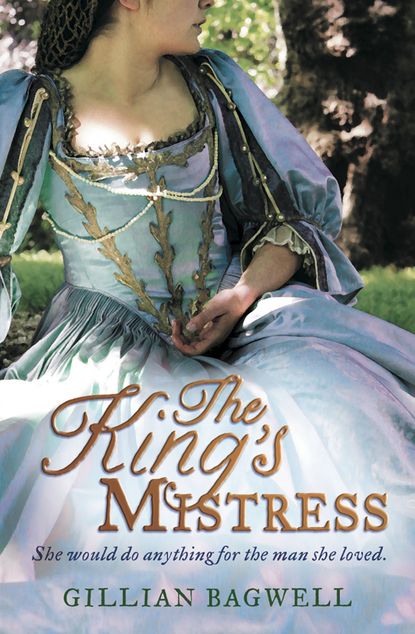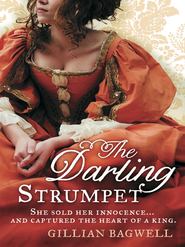По всем вопросам обращайтесь на: info@litportal.ru
(©) 2003-2025.
✖
The King’s Mistress
Настройки чтения
Размер шрифта
Высота строк
Поля
“That must be it,” Henry said, turning. He slowed so that Charles and Jane pulled even with him. “It’s a big household and there will be grooms enough to deal with horses,” he said, his voice low. “It would be safer for you to wait near the stables while Jane makes arrangements with her cousin to lodge you somewhere quiet.”
As they passed through the arched gateway, the road curved, and the great house stood before them, perched on the summit of the hill. Jane let out a little cry.
“What a grand house!”
It was a fine house, its imposing front three storeys high, with a row of a dozen gables along the roof, its vast lawns rolling away downhill in all directions. On the green before the house, eight or ten people were playing at bowls, and two or three more lounged on the wide front steps to watch the game’s progress. Jane was just as glad that she did not see Ellen among those gathered; she could ride to the back of the house with Charles and Henry and make a more quiet entrance than if she had had to stop to greet Ellen before all those people.
Henry had been right, and as soon as the horses approached the stables, two boys came running out to take the horses by their bridles while the riders dismounted.
“Wait here, Jackson,” Jane said, “while I find Mrs Norton.”
She didn’t have far to look, however, for a voice from above called out happily.
“Jane! You’re here!” Ellen leaned out a window, beaming. Jane laughed with pleasure to see the familiar tousled blonde curls and rosy cheeks.
“Ellen! How radiant you look!”
“Stay just where you are,” Ellen called. “I’ll be down directly!”
She appeared a moment later at the back door, and Jane rushed to embrace her, careful of her bulging belly.
“Come in, come in,” Ellen urged. “You must be worn out with the ride, and I’m so big I can scarce get about.”
“Ellen, you remember my cousin Henry Lascelles?” Jane asked. Henry and Ellen bowed to each other as Charles hovered in the background. “And I wonder if I might beg a favour. My man Jackson here has been ill of an ague. I would take it most kind if you would let him have a good chamber with a fire so that he might go early to bed, or I fear the boy will never recover.”
“Of course, of course, the poor lad,” Ellen agreed, giving a vague smile in Charles’s direction. “I’ll have Pope see to him directly. But come with me, dear Jane, I want all the news from home.”
Jane had just time to settle herself in her room, visit briefly with Ellen, and wash her hands and face and change her clothes before it was time for supper. She insisted on carrying a dish of broth to her ailing man herself, and the butler Pope showed her the way to the garret room where Charles was lodged.
“Mrs Norton has asked Dr Gorge to look at your man after supper, madam,” Pope said as they climbed the stairs.
“Oh,” Jane faltered, “that’s most kind.”
She tried without success to think how she could plausibly refuse the offer and decided she would just have to warn Charles. Fortunately, Pope left her at the door of Charles’s room, and she slipped in to find him stretched on a bed before a blazing fire. He sat up as she came in, grinning at the sight of the steaming bowl.
“Your friend is very kind to accommodate me so well,” Charles said. “Please give her the humble thanks of William Jackson, and let us hope that I can make more suitable thanks later.”
He tilted the bowl and drank hungrily, reminding Jane of a ravenous dog.
“Ah, that’s good.” He sighed in satisfaction.
“Don’t worry,” Jane smiled. “I’ll tell the butler you’re up to proper food, and I’m sure he’ll see to it that you’re well fed. But there’s a doctor visiting the house, and Ellen has asked him to look at you.”
Charles shrugged. “It’s not much of a part I have to play, being wan and weary.”
“Good,” Jane said. She knew she must hasten to the dinner table, but she was loath to leave him. “Shall I look in on you later, to make sure all is well?”
She said it carelessly, but wondered if Charles could hear her heart thumping in her chest.
“I would take it most kind,” he said, taking her hand, and she cursed herself because she knew she was blushing as she took the empty dish from him and went out the door.
THE HOUSEHOLD AT ABBOTS LEIGH WAS LARGE, CONSISTING NOT only of Ellen and George and George’s mother, but of sundry siblings and cousins and friends, including the clergyman and physician Dr Gorge, who had been watching the bowls when they arrived, and seemingly dozens of servants.
Over supper the discussion turned inevitably to the battle at Worcester and speculation about the fate of the king. Jane was glad Charles had suggested being kept secluded, and as soon as she could excuse herself after supper, she slipped up to his room. She was alarmed to find him with a bloody handkerchief pressed to his nose.
“What’s amiss, sir?” she cried.
“It’s nothing.” Charles waved off her concern, pulling the handkerchief from his nose to see whether the flow had stopped. “I get nosebleeds from time to time, with no rhyme or reason to them, but I suffer no ill effects beyond the inconvenience.” He patted the bed. “Come, sit with me.”
She sat beside him, very conscious of their being alone. He turned to her and took her hand, and she felt suddenly shy.
“Did the doctor come?” she asked, a trifle too brightly.
“Indeed he did. And as soon as I caught sight of his face, I knew him.”
Jane caught her breath in alarm.
“He was chaplain to my father when I was a boy. I kept to my bed, and as much as I could, turned my face from the candle so that I should be in shadow, and I don’t think he knew me.” He gave a wry smile. “Perhaps it was foolish to say I was ill. It’s made me an object of many kind attentions. The butler himself brought my dinner, and a maid came, too, with a warm posset to speed my recovery. Maybe it’s only my fancy, but I felt that they looked on me strangely.”
Jane’s stomach tensed in panic. “Oh, dear, what shall we do?”
“Nothing for now. Wilmot should be here tomorrow, and with any luck he’ll have news of a ship for me.”
Jane remembered with a catch in her heart that this might be the last time she would have Charles’s company alone. He seemed to read her mind.
“Oh, Jane,” he said, brushing a curl from her cheek and letting his hand trail down her jaw. “Would that I might keep you with me a little longer. I have been so much alone.”
She looked up into his face, seeing both the warrior king and lost little boy, and felt overwhelmed by desire and tenderness.
“When the war started,” he said, “my family scattered. I was twelve. I went with my father, and I tried to be a man. I cried most pitifully when I was parted from him three years later. It was in Oxford. It was raining, and I hoped that the raindrops would conceal the tears on my face. No ocean could have hidden my tears if I had known that I would never see him again.”
Jane saw that tears glistened in his eyes. He took her hand, and kept it resting on his thigh.
“His death was a cruel shock to England,” she said. “I cannot think what an unbearable grief it must have been to you.”
“I was told that on the scaffold he said just one word,” Charles said. “‘Remember.’”
A shiver ran through Jane.
“Like Hamlet’s father.”
“Yes. And here I am, like Hamlet, charged to avenge my father’s murder and the loss of his crown.”
“But you are not like Hamlet. You do not hesitate.”
“No, I need no Mousetrap to know where the guilt lies. And when the way seems hard, as now, I think to myself, ‘Remember thee? Ay, thou poor ghost, while memory holds a seat in this distracted globe.’”
He bent his head to Jane and kissed her, taking her head in his hands and pulling her close to him, and she responded hungrily, sinking back onto the bed as he moved towards her. He showered her with kisses, her eyes, her ears, her throat, then back to her mouth, and she burned for him with an intensity of feeling she had not known was possible. This was what she had been longing for—passion and love, lifting her above the dreariness of daily life.






